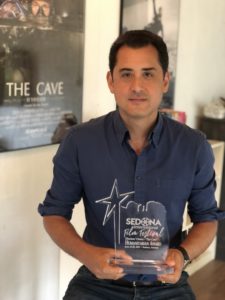 In 2018, a group of young Thai football players and their coach found themselves stranded in the flooded Tham Luang cave in northern Thailand. The rescue mission that involved countless divers, military personnel and volunteers from many countries took over 2 weeks to safely pull every one of them out of the cave. The incident once sent a shock wave reverberating around the world.
In 2018, a group of young Thai football players and their coach found themselves stranded in the flooded Tham Luang cave in northern Thailand. The rescue mission that involved countless divers, military personnel and volunteers from many countries took over 2 weeks to safely pull every one of them out of the cave. The incident once sent a shock wave reverberating around the world.
A year later, this nail-biting rescue event was made into a major motion picture “The Cave” by Tom Waller. I remember watching it on the opening day at a local cinema and was greatly impressed by the overall cinematic experience. Recently, I had a chance to ask Tom a few questions about his movies and life.
Q. Having raised by a Catholic father and a Buddhist mother, your movies have a distinctive relationship with spiritual elements of sin and repentance. If there is one new genre in your next movie, what would it be?
I’m interested in Sci-Fi but haven’t yet attempted anything in that genre. I am interested in how the human race evolves as a species. Does karma rule our future? Can we really all move to Mars??
Q. Let’s talk about “The Cave”. You were inspired by Clint Eastwood’s “The 15:17 To Paris”, and cast Jim Warny, the cave diver in Tham Luang cave rescue, in the movie. You met Jim in person while you were on a trip to Ireland. Tell us how did you convince him to play the role. Did you give him a screen test and how did you prepare him for the role?
I was very lucky to stumble across Jim, one of the real-life cave rescue divers from the mission, when I read about his return to Ireland in a newspaper. I got in touch through social media and met him in person. When he recounted his story to me, I had a burning desire to make his story into a film. So I filmed a short scene with him and his fiancée on my iPhone as a sort of screen test, to see how he would look on camera, and that convinced me anyhow that it might work, and I think it convinced him too! He was concerned that his story should be told in an authentic way, so part of that reassurance that I gave him was that by using him in the film playing himself, he could be sure I was telling the story in the right way.
Q. Making a movie based on a real-life event like “The Cave” can easily veer into a documentary format if the script is solely written based on the sequence of events. Besides telling the actual event as it occurred, you also included the rescuers’ account and experiences and emotions of those who were involved in the rescue, such as the plumber and the residents affected by the flood as a result of the water pumped out of the cave etc. Did you find it challenging to strike that balance when writing the script?
I primarily wanted to focus on the volunteer spirit of the rescue, which involved a lot of heroism and bravery from ordinary people who gave up their time to go and help at the scene. Since I was talking to the real participants in the rescue, it made the script writing much easier to write because much of the narrative choices had already been made for me. In real life, not every character was there for all of the timeline, so I chose to weave the storylines of several individuals who gave me their personal perspectives and recollections. I didn’t have to make anything up, since all of it happened for real. After all, sometimes the truth can be stranger than fiction!
Q. You have recruited many non-actors in “The Cave”, As a director, how did you get them into an “acting mode” as if they were in a real event?
The key to getting non-actors to ‘perform’ is actually to ask them not to ‘act’ but just to ‘be’ as much as possible the characters that they are playing. For the real rescue volunteers who appeared in “The Cave” as extras, this was relatively easy as they just had to recollect and re-enact what they were doing at the time. Then it’s up to the cameras to capture the best performance, that feels most natural and not too staged. Hence why we used a multi-camera approach for “The Cave” using long lenses so that we could record the magic moments without being too obtrusive.
Q. Let’s talk about “The Last Executioner”. The execution scenes are very intense and graphic. I love the way you create the execution scene juxtaposed with the serenity of nature. The silence, the glitch of the machine gun, the harrowing moment before the death, everything is so well set up. Tell us the process of crafting these intense scenes. In your opinion, what makes a scene intense?
For me the key to creating an intense scene is to try and keep the viewer engaged through clever use of both image and sound, sometimes trying to evoke an almost claustrophobic nature that creates an uncomfortable feeling, so you feel the intensity of the narrative at that point in the film through extreme close-ups, slomo and other tricks of the trade.
Q. In one of your interviews, you said ET is the first movie that inspired you as a child. What would you be if you were not in the film industry?
I have no idea what I would be doing if I wasn’t a filmmaker. I don’t know if I could apply myself to any other industry. I think I would still be a professional dreamer of some sorts.
Q. You are the writer of “The Cave”, “Mindfulness and Murder” and a short film “Eviction”. Tell us about your creative process and how do you overcome your writer’s block?
I find it very hard to write. You have to have the discipline to shut off from everything else in order to concentrate on the writing alone. It’s tough. Possibly why I don’t write so much. I get distracted too easily!
Q. Some directors star in their own movies or make a cameo appearance. Imagine if you were to star in a movie that you are directing, what kind of character would you play?
If I was doing Star Wars, I’d be a stormtrooper (or a Jedi).
Q, The Director rules the set. For example, Quentin Tarantino does not allow cell phone on the set. Are there any rules you set and what kind of culture you encourage on the set?
Although it might be a Director’s medium, the process of creating a film is a collaborative process. I encourage my key team to offer their own ideas or suggestions. I think there is a fine balance of course to stick to the narrative choices you choose, and to be 100% focused on the story you are trying to tell rather than being swayed by third party’s opinion. I don’t have rules for my crew as such, but I try to make sure everyone is working in a safe and relaxed environment. My crew are also like extended family. We meet between movies and hang out from time to time.
Q. What is one quote or mantra that you always live by when working on a movie?
Life is short, so do what you love. I love making movies, so I live by that mantra!
Q. You are currently living in Bangkok with your family. What would be your ideal day in Bangkok when you are not working?
My family enjoy the sun and sea, so ideally, we would leave Bangkok and hit the beach! But if I had to stay in Bangkok, my ideal day might be something like taking a boat trip on the Chao Phraya for lunch somewhere riverside, then taking the kids to see a movie on a huge IMAX screen in the afternoon, followed by Korean BBQ in the evening 😉
BIOGRAPHY:
Tom Waller is an award-winning filmmaker with over 20 years of experience working across a broad spectrum of critically-acclaimed films including his directing debut Monk Dawson (1998), Mindfulness and Murder (2011), The Last Executioner (2014) and his iconic masterpiece – The Cave (2019), a movie based on the Tham Luang cave rescue in Chiang Rai Province, Thailand in 2018.
His biopic based on the life of Chavoret Jaruboon, Thailand’s last gun executioner – “The Last Executioner” won the Best Picture “Tukkata Tong” Golden Doll Award (Thailand’s equivalent of a Golden Globe) and the winner of the World Premieres Film Festival. The movie also won him the Best Director title at Dhaka International Film Festival. “The Cave” is the winner of the Directors’ Choice Best Humanitarian Film Award at the Sedona Film Festival.
Tom founded his production company De Warrenne Pictures in 1996. He currently lives in Bangkok with his four children.
All photographs credit: Tom Waller
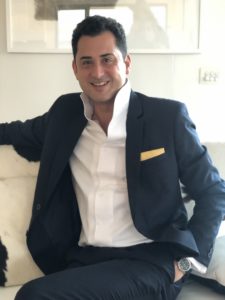
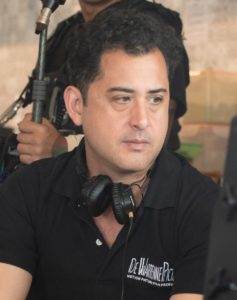
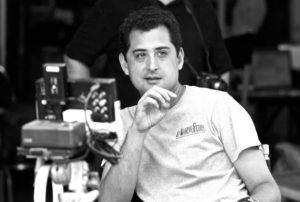
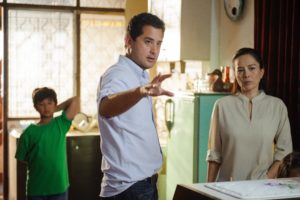


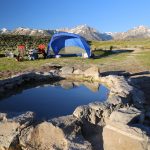


Congratulations on getting this film made, Tom. Wish you wonderful luck with it.
This is very cool read. I look forward to watchin the film, AND returning to Thailand asap!